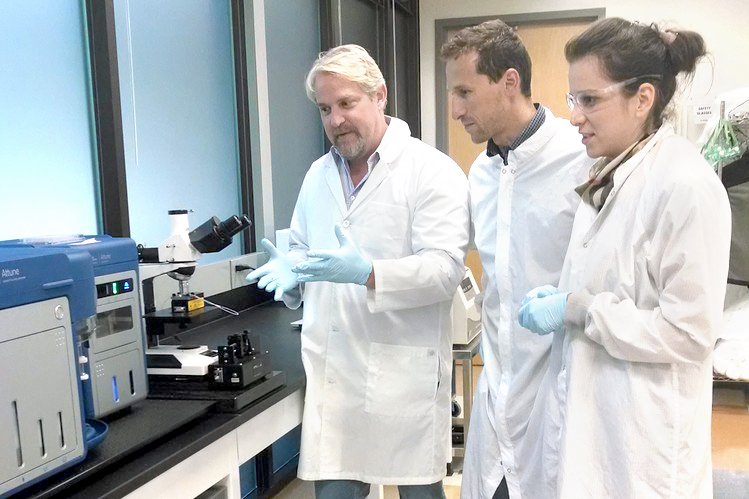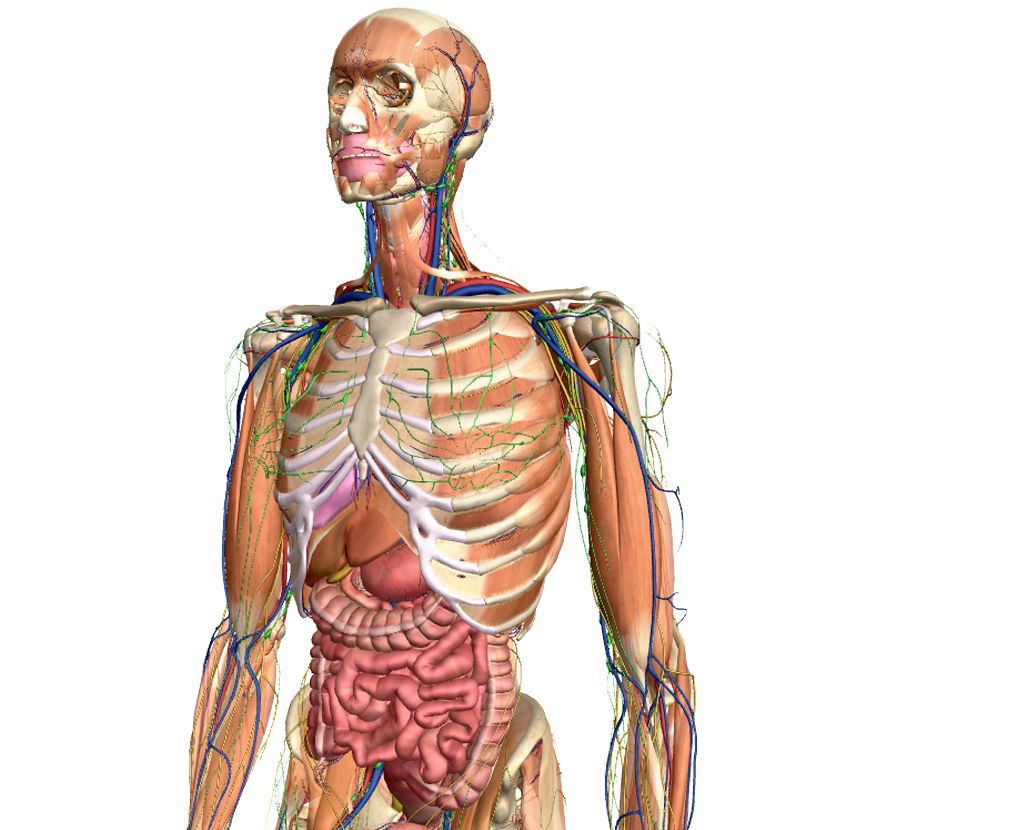Baseline Study by Google
Google’s “Baseline Study” aims to get clear picture of human health
Google’s newest project aims to create a crowd-sourced picture of human health by collecting anonymous genetic and molecular information from participants.
The project, called Baseline Study, will start off by collecting data from 175 people, but Google hopes to expand that sample size to thousands more, the Wall Street Journal reports.

Andrew Conrad, head of Google X’s Life Sciences team, shows colleagues Alberto Vitari and Marija Pavloic some of the instruments they will be using in the lab for biomedical research. (credit: GoogleX)
The researchers hope the project can help move medicine towards prevention over treatment by giving scientists a more accurate picture of what a healthy body looks like, which can help them detect ailments like heart disease and cancer much quicker.
The lead researcher, Dr. Andrew Conrad, said that part of detecting disease is getting a clear picture of how a healthy body works. “We are just asking the question: If we really wanted to be proactive, what would we need to know?” he told the WSJ, which originally reported on this project. “You need to know what the fixed, well-running thing should look like.”
The project will collect hundreds of samples, and then find “biomarkers,” or patterns, within the data. Scientists hope these biomarkers will help them detect disease much sooner, or tell them which kinds of biological conditions make someone a likely candidate for high cholesterol.
Google said that the information from Baseline would be both private and anonymous, would be used only for medical purposes, and wouldn’t be shared with insurance companies. Institutional review boards from Duke University and Stanford University will monitor the study to make sure the data isn’t being misused, Google said, and will only have access to the samples once they’ve already been stripped of identifying data, like names and social security numbers. The samples will be collected by independent testing companies.
But Google wants to collect a staggering amount of information about each of its anonymous human guinea pigs. They’re mapping each person’s entire genome, and their parents’, not to mention looking at how they metabolize food, and how their hearts beat, and their oxygen levels. Participants will even wear special smart contact lenses so Google can monitor their glucose levels.
The Baseline project is the latest endeavor of GoogleX, the arm of the company devoted to long-term, high-risk projects with potential for high reward.
Source: Time / WSJ
=================================
Google X Baseline Study
=================================
Google calls for guinea pigs for ambitious ‘Baseline’ health study
Study with Duke and Stanford Universities aims to revolutionise treatment of disease through the study of healthy people
What are they doing?
The Baseline study is a scientific investigation into what it means to be healthy. It will collect data from healthy individuals, crunch the numbers and define a healthy state for a human being from real-world people.
Why study the healthy?
Why study someone who isn’t sick? Modern medicine is good at treating diseases with obvious symptoms. But at the point at which a disease is showing symptoms severe enough to send someone to the doctor, the disease has been running wild within that person’s body for a good while.
By defining a baseline of what it means to be healthy, it is a lot easier to detect changes and pick up serious, life-threatening diseases before they become dangerous. Catching illness much earlier can either diminish the impact or neutralise the disease before symptoms appear.
Who’s being studied?
Google’s study will initially take 175 volunteers from various groups of ethnicity, habit and area and conduct testing of methods and practices to inform a much larger study later on. That small select group of people is expected to expand to around 400 or so by the end of the year.
Where are they?
The study is currently limited to the US, but Google will not say where for fear of biassing the study. Participants will know they are part of a clinical study but may not know which. By keeping the location a secret the study can screen out bias of people specifically seeking out Google’s study, which could skew the results.
When’s the study and how long is it running?
The initial pilot study will run this summer, with further participants added as the year draws to a close. The plan is the run the study on a long-term basis for as much as 10 years or longer.
Who’s running it?
The man in control of the study is Dr. Andrew Conrad of Google X, but Google is not conducting the experiment alone: Duke University and Stanford University medical schools are working closely with the search giant to design the experiments and study the data.
The actual study of participants will be conducted by a clinical partner, which is standard practice for human studies.
What are they doing to the volunteers?
Each of the 175 participants in the study, and those joining later, will be examined very much like a trip to the doctors. Bodily fluids, including blood and saliva will be collected and their DNA sequenced.
Family genetic history, data on how they digest food, how they react to drugs, how fast their hearts beat and other biological data will be collected and collated.
The point of the study is to document the underlying chemistry of a healthy human body, far beyond the standard observable conditions of a healthy person. The complex body chemistry will define a normal state, making it much easier to see when something has changed indicating something might be wrong or a disease might have just taken hold.
What are they doing with the data?
The data will be collated and anonymised by the clinical researchers. From that point the biochemical data will be compared with the person’s lifestyle, age, habits and other physical factors to create a detailed picture of what a healthy person looks like on the inside and out.
Qualified researchers, both within Google and the wider academic community, will then be able to analyse the data to see if their are any biochemical signs of one lifestyle or another and to create a “biochemical fingerprint” or baseline from which changes can be easily identified.
It is hoped that the data will also reveal patterns to illness that allow doctors to pinpoint the very early stages of disease, or even biochemical patterns that indicate an increased likelihood of developing a disease. Someone’s body chemistry who can digest fatty foods better ensuring low cholesterol will look different to others that cannot, highlighting those that could be susceptible to high cholesterol and heart attacks, for instance.
Does Google have access to that wealth of data?
Studies like Baseline are strictly controlled by government regulation, as well as being reviewed by independent ethics committees know as Institutional Review Boards. The study will be run by a doctor at a medical clinic who will be acting as the principle investigator – similar to the professors and doctors that oversee scientific and medical projects in academic labs that employ PhD students – despite Conrad leading the project from Google’s end.
The principle investigator will be the one responsible for the data and it will be anonymised before being analysed. The participants in the study are also volunteers, who must agree and sign a consent form before taking part. They may also leave at any time.
Where does Google come in?
Google is providing money to get the project off the ground, in a similar way to other scientific funding bodies. It will also aid in the initial protocol design for the pilot study.
Google has built a team of around 100 scientists, including Conrad, who was the chief scientific officer of a diagnostics lab firm LabCorp, and Dr. Vikram Bajaj, a biochemist and chemical physicist who moved from University California Berkeley.
Bajaj previously worked on early disease screening and point-of-care testing, which aimed to help speed up diagnosis of disease and allow doctors to begin accurate treatment of the disease as quickly as possible.
Google will also lend its programming and computational expertise, helping with the computer analysis of the data – something that is traditionally very expensive for academics to get access to.
Eventually, Google will also design and develop new wearable technology to monitor the health of participants in the study, providing more data on things like heart rate, blood pressure and possibly going as far as body chemistry as they go about their daily lives – the ultimate quantified self.
But why now?
A study like Baseline is traditionally prohibitively expensive to accomplish. The biochemical analysis was costly and time consuming, the DNA sequencing used to cost $100,000s and the computer analysis was restrained by processing power.
Now the molecular analysis tools have dramatically decreased in cost (DNA sequencing of a person’s whole genome now costs more like $1,000), and the access to new tools has both sped up testing and made the analysis of very complex biochemical interactions with the body possible.
Google’s vast computing power, used to run its search engine and various other services, also make a big contribution to how effective the study can be.
Studies in the last decade have attempted to do something similar, but have fallen through because of the sheer cost of operating them.
What’s in it for Google?
The benefits for science and medicine is clear. What’s not clear is what Google gets out of it. Baseline is being funded by Google X, which was set up to “focus on problems that affect millions of people in their daily lives and try to tackle them from a completely new perspective”.
Google Glass and the company’s self-driving cars are also products of Google X. Google states that the “research is intended as a contribution to science; it’s not intended to generate a new product at Google.”
That sounds altruistic, and it could be, but it could also give Google a route into a lucrative health market much further down the line, not directly from this study or the experiments and data from within it, but from spin-off ideas.
Google’s chief executive Larry Page has been outspoken about the potential benefits of data mining healthcare information, which has been a taboo subject for years over fears of profiling and use of the data by companies to exclude individuals.
Having failed to convince others to open up medical data, Baseline seems to be Google’s self-funded attempt to kickstart a new healthcare data revolution, proving the benefits first-hand.
What is it going to do for general public?
Google’s Baseline is first and foremost an academic exercise – there is no immediate outcome for the general public. But the science and data behind it could radically improve the way modern medicine operates.
Switching from a system predicated around the treatment of symptom-displaying disease to a system that could identify issues before they become a disease – preventing the disease in the first place – could improve the health of the general public and reduce the financial burden placed on the healthcare system treating people when a disease is intrenched and difficult to treat.
That is likely a long way off from now, but scientists have to start somewhere and Google’s funding is certainly a big help to get things off the ground.
Source: Samuel Gibbs / theguardian


